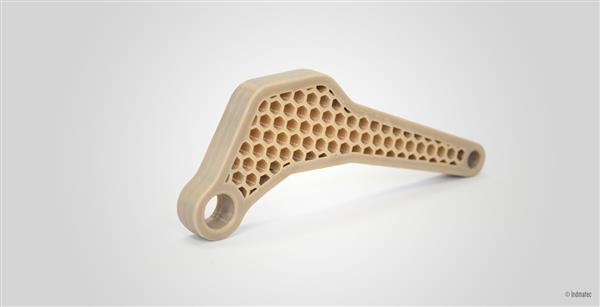 PEEK 3D Printing Material Shows Promise for Auto Manufacturing Sector: Indmatec, a 3D printer and 3D printing filament manufacturer from Karlsruhe, Germany, has outlined ways in which PEEK (Polyetheretherketone), a poylmer 3D printing filament, could be used to improve car production.
PEEK 3D Printing Material Shows Promise for Auto Manufacturing Sector: Indmatec, a 3D printer and 3D printing filament manufacturer from Karlsruhe, Germany, has outlined ways in which PEEK (Polyetheretherketone), a poylmer 3D printing filament, could be used to improve car production.
Additive manufacturing is being used more and more in the automotive sector—just look at our recent list of 25 3D printed cars for the evidence. But while some auto engineers are most interested in figuring out which parts of a car could be 3D printed, others are more interested in what materials can be used to most efficiently create those 3D printed parts. Most car manufacturers prefer SLM or SLS printed metal for critical end-use parts, but German 3D printing expert Indmatec believes that PEEK, a thermoplastic polymer, could help the industry shift its 3D printing operations into a higher gear.
It should come as no surprise to learn that Indmatec is indeed one of the foremost producers of PEEK 3D printing filament, yet its comments on the automotive industry need not be taken simply as marketing exercise—material specialists such as Evonik and Victrex have also tested out PEEK automotive components, and the polymer is already used in many industries to produce bearings, piston parts, vales, and other important components. Without further ado, let’s take a peek at what PEEK might do for the automotive industry.
As most manufacturers now realize, 3D printing can be used to create metal components that weigh significantly less than traditionally manufactured variants. This is because the technology can create geometrically complex structures and objects with partially hollowed-out interiors. But while 3D printed metal parts can weigh much less than other metal parts, metal itself can still be relatively weighty. By 3D printing with another, more lightweight material, manufacturers could reduce the weight of a components even further. According to Indmatec, PEEK could be that very material.
By using PEEK instead of metal, automotive manufacturers can reduce the weight of a part by up to 70%, which results in a fuel saving of 1-2%, a seemingly small improvement that can go a huge distance in terms of a consumer’s expenditure—not to mention the resulting environmental benefits and the commercial benefits that follow. Additionally, PEEK parts have shown 25-75% less wear than metal parts, and are also less dependent on lubrication and are less noisy.
Read More from the source













